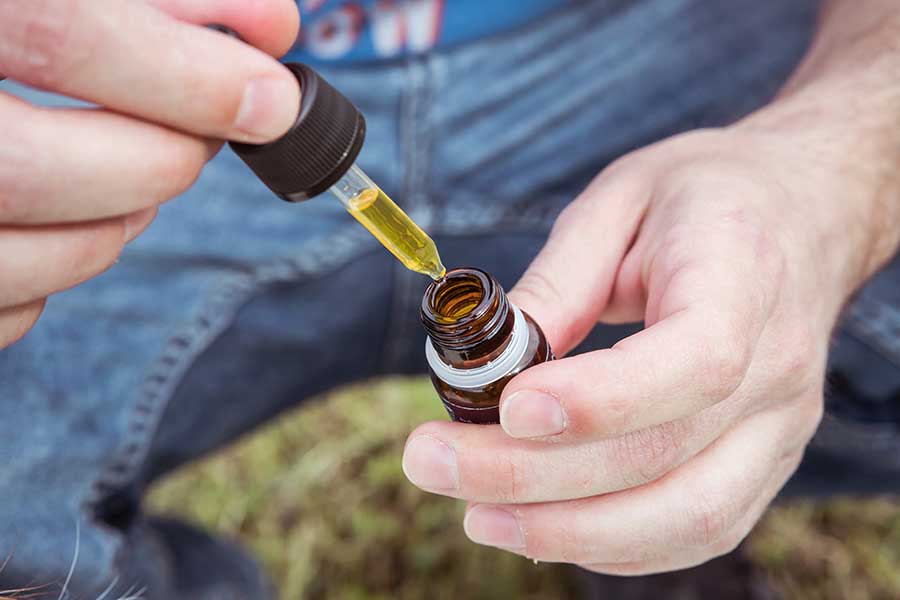Reviewed by Phillip Waite, Ph.D.

By now, you’ve probably heard the buzz about CBD oil and its purported health benefits. Once a rarity on store shelves, hemp extract is now sold in capsules, gummies, creams, candies, beverages, and even bath products. With all of its popularity, many prospective buyers wonder if it can really help with conditions like chronic pain. Although there is still a lot to learn, current research studies show promise.
What is CBD?
Cannabidiol (CBD) is an important chemical component of marijuana and hemp plants. It does not produce the high associated with another main component of cannabis, tetrahydrocannabinol (THC). CBD affects the endocannabinod system, which helps regulate pain response, sleep, stress response, and other important functions. It can be used alone or in combination with other cannabinoids and pain medications.
Potential Uses for CBD
CBD is gaining ground in medical applications, and is already used in prescription treatments for multiple sclerosis and a rare seizure disorder. It may relieve depression and anxiety symptoms in some patients, too. A lot of current research (and consumer interest) revolves around its usefulness in pain relief. While it is not used as a prescription pain medication at this time, studies have shown potential for relieving chronic pain caused by a variety of medical conditions. Patients with the following conditions may see some relief with CBD:
- Neuropathic pain
- Osteoarthritis
- Rheumatoid arthritis
- Sciatica
- Fibromyalgia
- Lupus
- Lyme Disease
- Sjogren’s Syndrome
- Crohn’s Disease
- Ulcerative Colitis
While the FDA does not test or regulate CBD products, research into their benefits continues. Scientists are studying the effects of CBD on chemotherapy side effects, neurodegenerative disorders, and tumor growth. However, more human studies are needed for a clear picture of CBD’s potential benefits.
What to Consider Before Using CBD
1. Rules and Regulations
CBD is considered a supplement, not a drug. As a result, CBD products are not regulated by the FDA. This makes it difficult for consumers to know if they are getting as much CBD as the manufacturer states, or whether the product is free from contaminants. It’s a good idea to check out a manufacturer’s website and look for third-party testing data. You should have access to reports on the CBD content and purity of their products. If that is not readily available on the website, the company should provide it to you on request. Be wary of any seller that refuses to give you this information.
2. Current Medications
The liver processes CBD, just as it does many other supplements and medications. Interactions may be possible, so it is important to check with your doctor before using CBD products.
3. Potential Side Effects
CBD is generally well-tolerated, especially in lower doses. Some users report mild side effects, such as dry mouth, sleepiness, diarrhea, and weight changes. Starting with a lower dose and gradually increasing may reduce your risk of side effects.
4. Consumer Reviews
This part can be tricky. User experiences for any supplement are subjective, and one person’s experience can differ dramatically from another’s. It helps to go to multiple websites and message boards to get a well-rounded picture. Be careful of any reviews that claim CBD is a miracle drug that can cure serious illnesses, as there is no data to back up those claims.
Moving Forward With CBD
So you’ve checked out the research and talked to your doctor, and you feel ready to give CBD a try. The next step is figuring out which formulation will be most effective in managing your pain. You have a lot of options, so it helps to have a little guidance when choosing the right product for you.
Delivery Method
Do you prefer the convenience of pills, the quick delivery of liquids, or the soothing properties of topical medications? CBD comes in numerous forms, including:
- Topicals – lotions, creams, and salves may help with localized pain relief. CBD generally will not enter the blood stream.
- Oils and tinctures – these can be held under your tongue for quick absorption or mixed with food and beverages to disguise the taste.
- Tablets and capsules – these are quick and convenient if you don’t mind swallowing pills, though they may take longer to kick in.
- Chewables – CBD gummies, candies, and chewable tablets are great alternatives for people who want convenient dosing, but don’t like swallowing pills. A lot of them taste great, too!
Dosage
There are not hard and fast guidelines when it comes to CBD dosing. Over-the-counter products may contain anywhere from 1 milligram to over 50 milligrams of CBD per dose, and most recommendations you find are anecdotal. A good rule of thumb is to start small and slowly increase the dose until you find relief.
In Conclusion
While research into the pain-relieving properties and other health benefits of CBD is in its infancy, current studies show promise. CBD may be a natural alternative for pain management for people dealing with arthritis, neuropathy, and other painful conditions. As with any supplement, be sure to check with your doctor before joining this health trend.
Did you find this article helpful? Join us at HealingWell for support and information about your condition. Connect and share with others like you.




